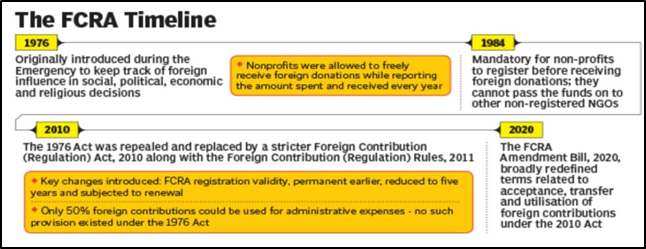In News:
- The Ministry of Home Affairs has cancelled the Foreign Contribution Regulation Act (FCRA) license of the Rajiv Gandhi Foundation (RGF) and Rajiv Gandhi Charitable Trust (RGCT) for alleged violations of the law.
- All orders of cancellation of FCRA licence by the government can be challenged in the High Court.
Background:
- In 2020, the central government had set up an inter-ministerial committee to “coordinate investigations” into the funding of three trusts linked to the Nehru-Gandhi family — the RGF, RGCT and the Indira Gandhi Memorial Trust.
- All three organisations are headed by Sonia Gandhi.
- Former Prime Minister Manmohan Singh and Congress leaders P Chidambaram, Rahul Gandhi, and Priyanka Gandhi Vadra are among the trustees at the RGF.
- Alongside, investigations into violation of various legal provisions of PMLA (Prevention of Money Laundering Act), Income Tax Act, FCRA etc., were to be conducted as well.
- The current order to cancel the FCRA licence came in response to this investigation.
What’s in Today’s Article:
- FCRA 2010 - About, background, key highlights of 2010 act and 2020 amendments)
In Focus: The Foreign Contribution (Regulation) Act (FCRA), 2010
- The FCRA regulates foreign contributions/donations and ensures that such contributions do not adversely affect internal security.
- The FCRA is applicable to all associations, groups and NGOs which intend to receive foreign donations.
- It is mandatory for all such NGOs to register themselves under the FCRA.
- Registered associations can receive foreign contribution for following purposes:
- Social; Educational; Religious; Economic, and Cultural.
Timeline:

- In 2015, the MHA notified new rules under the act. These new rules required:
- NGOs to give an undertaking that the acceptance of foreign funds is not likely to prejudicially affect the sovereignty and integrity of India or impact friendly relations with any foreign state and does not disrupt communal harmony.
- Again, the Foreign Contribution (Regulation) Amendment Bill, 2020 was introduced in Lok Sabha in September, 2020.
- The bill received Presidential assent & thus became an Act.
Key Highlights of the 2010 act & amendment made in 2020
- Prohibition to accept foreign contribution
- Under the Act, certain persons are prohibited to accept any foreign contribution.
- These include: election candidates, editor or publisher of a newspaper, judges, government servants, members of any legislature, and political parties, among others.
- In 2017 the MHA, through the Finance Bill route, paved the way for political parties to receive funds from the Indian subsidiary of a foreign company or a foreign company in which an Indian holds 50% or more shares.
- The 2020 amendment added public servants (as defined under the Indian Penal Code) to this list.
- Transfer of foreign contribution
- Under the Act, foreign contribution cannot be transferred to any other person unless such person is also registered to accept foreign contribution, or has obtained prior permission under the Act to obtain foreign contribution.
- The 2020 amendment prohibited the transfer of foreign contribution to any other person.
- Aadhaar for registration
- 2020 amendment mandated that any person seeking prior permission, registration or renewal of registration must provide the Aadhaar number.
- In case of a foreigner, they must provide a copy of the passport or the Overseas Citizen of India card for identification.
- However, in April 2022, Supreme Court read down this section and held that producing Indian Passport for the purpose of their identification would be enough.
- Now it is not mandatory for all office-bearers of NGOs to provide Aadhaar number.
- FCRA account
- Under the Act, a registered person must accept foreign contribution only in a single branch of a scheduled bank specified by them.
- However, they may open more accounts in other banks for utilisation of the contribution.
- 2020 amendment stipulated that foreign contribution must be received only in an account designated by the bank as “FCRA account” in such branch of the State Bank of India, New Delhi, as notified by the central government.
- No funds other than the foreign contribution should be received or deposited in this account.
- Renewal of license:
- Under the Act, every person who has been given a certificate of registration must renew the certificate within six months of expiration.
- The 2020 amendment provides that the government may conduct an inquiry before renewing the certificate.
- Use of foreign contribution for administrative purposes
- Under the Act, a person who receives foreign contribution must use it only for the purpose for which the contribution is received.
- Further, they must not use more than 50% of the contribution for meeting administrative expenses. 2020 amendment reduced this limit to 20%.
- Suspension of registration
- Under the Act, the government may suspend the registration of a person for a period not exceeding 180 days.
- 2020 amendment added that such suspension may be extended up to an additional 180 days.










